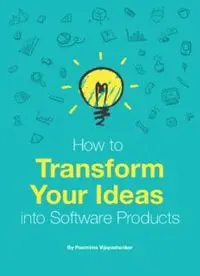Table Of ContentHow to
Transform
Your Ideas
into Software Products
By Poornima Vijayashanker
I
How to Transform
Your Ideas into
Software Products
A step-by-step guide for validating
your ideas and bringing them to life!
By Poornima Vijayashanker
II
Copyright
© 2014 by Poornima Vijayashanker.
III
Dedication
To everyone out there who has an idea, and
to those who support them in bringing that idea to life!
IV
Acknowledgements
The following folks were kind enough to help me by reading through the early
manuscript, providing feedback, and ofering motivation to get me through the
process:
Addison Huddy Akshai Prakash
Ahmed Muzammil Alyssa Ravasio
Adii Pienaar Ben Congleton
Bernadette Cay Blossom Woo
Brittany Forsyth Carol Willing
Christian Russ Christine Luc
David Acevedo David Cummings
David Kadavy Dave McClure
Dominic Jodoin Fernando Garrido Vaz
Hiten Shah Ilya Krasnov
Indi Young Jason Pelker
James Russell Jason van den Brand
Jocelyn Goldfein John Siwicki
John Sawers Julia Grace
Lauren Hasson Lonnie Kragel
Marina Braverman Melody McCloskey
Mila Vukojevic Noah Kagan
Renata Lima Ritika Puri
Sramana Mitra Silvie Hibdon
Tamara Austin Tim Kent
Thomson Nguyen Zakiullah Khan Mohammed
Thank you for all your time and eforts in getting this book out of my head and into
print :)
I’d also like to thank our kind sponsors for making it possible to create a print version
of this book: Framed Data, Hackbright, New Relic, and Shopify.
V
Special thanks to: Nathan Barry for educating me and helping me navigate the self-
publishing process; Nathalie Arbel, my encouraging and thoughtful editor, who kept
up with me and helped me stay true to my voice; my designer, Shiran Sanjeewa,
who took on the project at a moment’s notice; and my assistant, Justin Reyes, for
everything you do every day!
You’ve all contributed immensely to this project, and I’m happy it bears your mark on
it.
A fnal thank you to my dear boyfriend, Aaron Wilson, who was there to help me
keep my chin up and my belly full!
VI
VII
Table of Contents
How to Come Up with Ideas, Pare Them
Down, and Share Them! ............................................................................... 1
Start with a Side Project ............................................................................... 25
Building an Audience Before You Build Your Product ............................ 75
Finding Your Customer Segment ............................................................... 95
Identifying Your Ideal Customer ................................................................ 121
Diferentiating with Design ......................................................................... 135
What to Put in a Prototype .......................................................................... 163
How to Manage Product Development and
Attract Top Technical Talent ........................................................................ 182
Scrappy Marketing Strategies ..................................................................... 212
How to ASK for Your First Dollar ............................................................... 238
Metrics that Matter ....................................................................................... 254
Successful Launch Strategies ....................................................................... 280
Getting Working Capital to Build Your Product
and Your Business ......................................................................................... 298
VIII
Introduction
When I was growing up, my dad would come home from work and say things like,
"I’ve spent the whole day packaging up chips." Or, "Those wafers have a lot of defects in them."
Meanwhile, I’d be thinking, "Yummy… my dad makes potato chips and vanilla wafers!"
And I always wondered why he never brought any home.
One fateful day, my dad came home and asked me if I’d like to visit a fab, or
fabrication facility, where he worked. Of course, I said yes, and I was really excited!
The next day as we approached the fab my dad warned me not to touch anything
because the oils from my hands would contaminate the chips and wafers. I agreed
that I wouldn’t. As I walked into the facility I noticed that people were decked out
head to toe in white outfts (I later learned these were called "bunny suits"). I kept a
lookout for anything that resembled a snack.
But the only thing I spotted that was interesting to me was a small glass box in the
middle of the room. As I approached the box, I noticed that a tiny robotic arm was
very precisely picking up one small black square at a time and moving it to another
side.
In that moment, I completely forgot about the reason I was there and became
mesmerized by the precision of this robotic arm
At that point, my dad explained that he was a hardware engineer, and he made silicon
wafers and microchips that went into computers. Oh! I wasn't disappointed—rather, I
became more intrigued by technology.
IX
I wanted to combine my years of research, lessons, and collaboration with real-life
entrepreneurs into an easy-to-follow guide. This book begins by helping you choose
the right idea and then lays out a roadmap for launching and sustaining it as a
proftable business. If you stick with me through the whole journey, we will transform
your brainchild from rough sketch to useful software!
To create a successful product in any industry, you frst have to make sure your idea
is valid.
What is idea validation?
It’s the process of:
1. Sharing an idea with others, getting constructive feedback, and parsing
responses to fnd common themes.
2. Identifying actual problems people are experiencing in the world, versus
what you believe or guess are problems, then designing a solution to
address these issues.
3. Figuring out who is experiencing the problem and whether your solution
will solve it for them.
4. Making sure those who want your solution will also value it by paying for
it.
5. Looking ahead at the potential product’s context and market to determine
whether the idea could eventually become a viable business.
X

